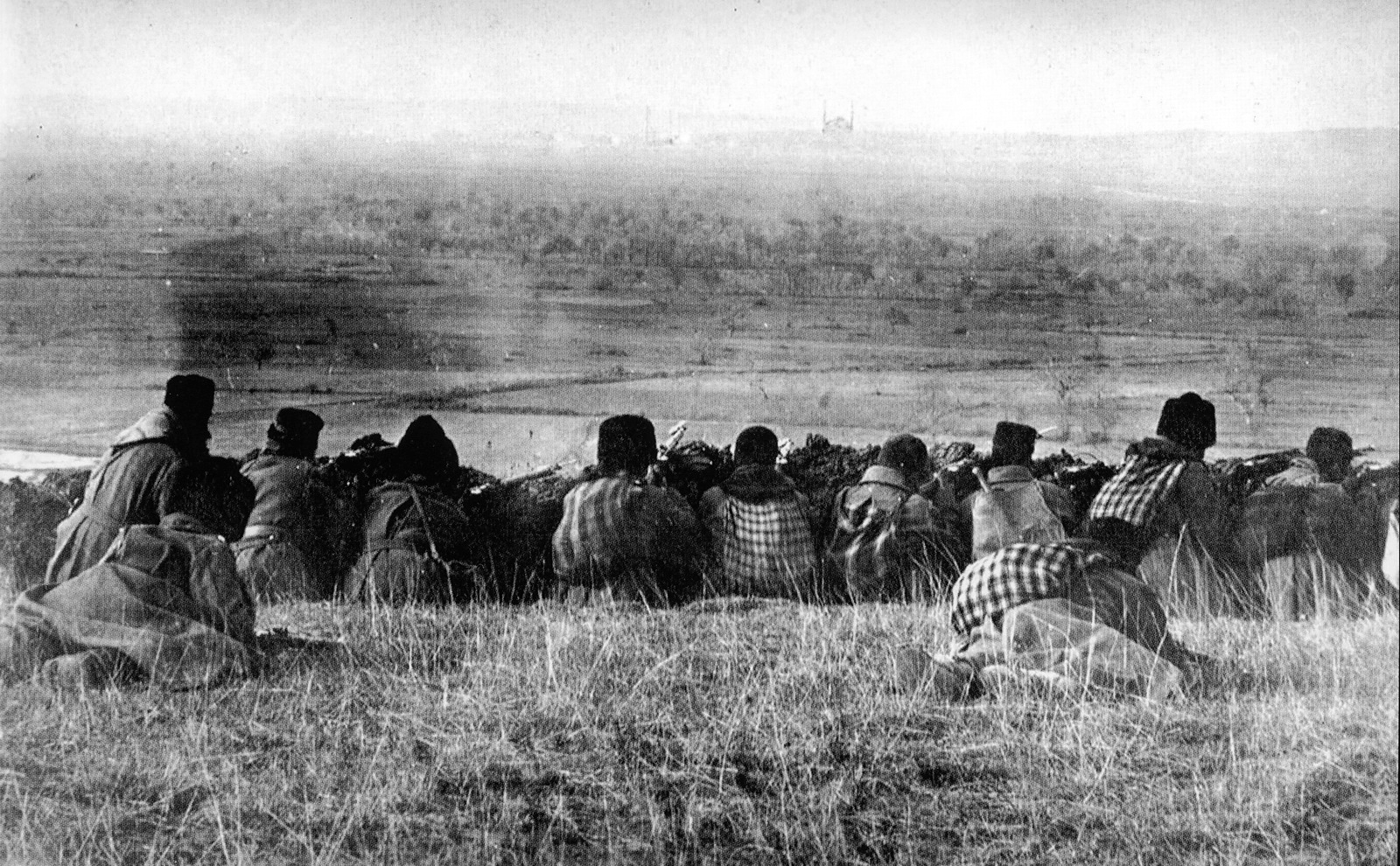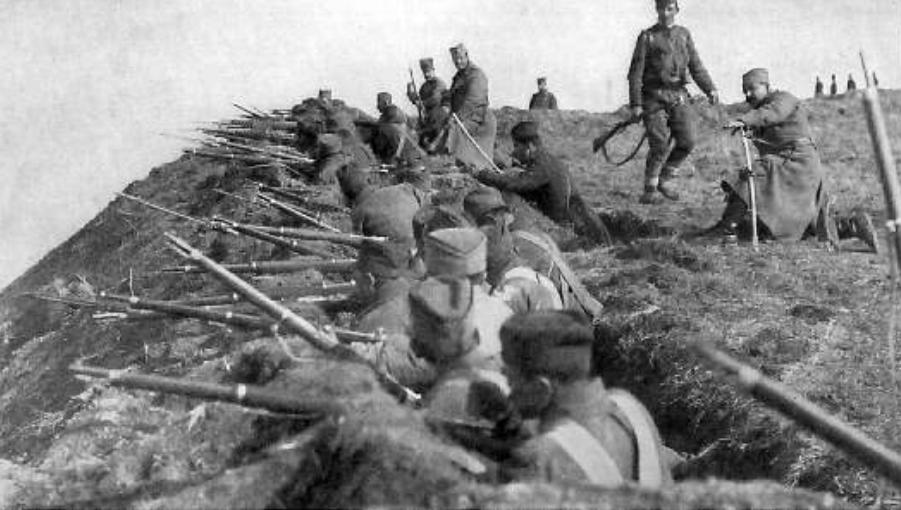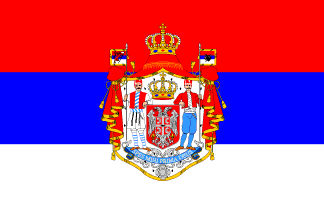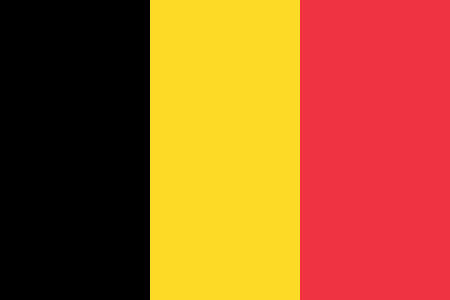The Balkans War
The mobilisation of the Balkan States as a reaction to Ottoman forward deployments in Thrace led to the Ottoman Empire declaring that they were defending themselves from aggression from the Balkan States and mobilised in return. Aggressive rhetoric from both sides, large standing armies, the Balkan States announcing they were in league with eachother, and the fact that this was all on the Balkans. It was obvious to everyone that this powder keg was about to blow.
The first shots were fired on the Turkish-Bulgarian border in what the Turks claimed was a border skirmish instigated by the Bulgarians. The international community, having seen the precedent set by the Porte in the Balkans, refused to believe the first thing of it and the press presented the Ottoman claims in a negative light. Despite all their efforts at looking like the defending party, the Turks knew it was too late to turn back. The first operation of the war was a small attack in the direction of Sofia to test the strength of the Bulgarian army.
The Turkish assault in the direction of Sofia went very well, quickly moving to the city’s outskirts. But as they entered the outskirts, the Bulgarian lion roared with a ferocity nobody thought possible. Much of the tiny state’s army was hiding inside the city and through a mix of deception and strategic strongpoint placement, created the impression that they were a force much larger than they were. A quick skirmish followed and the Ottomans retreated out of the city and back toward the border, were things would settle in to a defensive war between the two sides for some time.
Where the Turks expected to gain bigger successes was in the smallest state: Montenegro. The country’s size, and the fact that every man kept a rifle, revolver, and uniform in his home, allowed the country to completely mobilise within forty-eight hours. With the Turkish offensive slow to commence, Montenegro was quite ready by the time the Turks actually arrived in the country. During multiple skirmishes throughout their territory the Montenegrins used the terrain to its advantage and fought an incredible defence against the Turkish invader. Montenegrin tactics tended to involve constant harassment of Ottoman units. Early on they would lure Ottoman forces out of their main concentrations with small defenses of towns, and then ambush and destroy the detachments that moved to destroy them.
Despite heroic resistance, it was evident that the defence of Montenegro was a pipe dream. Casualty rates, well individually small, were mounting up quickly, and Ottoman forces in the region were only getting larger. A general retreat to Serbia was ordered, but roughly a third of the army refused to retreat and waged a deadly guerrilla war in the country, as the rest linked up with the Serbian army which launched successful assaults into Novi Pazar.

Montenegrin guerillas firing at a Turkish scout party
Fully mobilised and bolstered by the arrival of their Montenegrin brothers, the Serbian Army went on the offensive in Kosovo, attempting to cut off the Turks in Montenegro to placate their reinforcements, cut off a large portion of the Turkish Army, and to score a moral victory in conquering the ancestral homeland of the Serbs. Ottoman defensive forces along the Serbian border were very light, mostly because the majority of troops that had been stationed there were re-route to help suppress the Montenegrin guerrillas. As a result the operation was a massive success, with Kosovo and Metohija being captured with ease, and the Ottoman forces that were preparing to attack Novi Pazar forced to withdraw out of Montenegro toward the fortress of Shkoder. The scrambling retreat to the fortress was a horror on the same degrees as the British withdrawal toward George.
Montenegrin guerrillas, attacking from forests, mountains and ditches, extracted significant amounts of casualties on the retreating Ottomans, and even managed to capture much of the Ottoman field artillery and equipment. Desertion set in, mostly among the Albanian troops in the army and by the time the force arrived at the Shköder fortress it had been reduced to a skeleton of its original state, and the fortress was expected to fall with ease to Montenegrin forces.
The ensuing battle for the fortress still managed to be one of the highlights of the war. The Ottoman troops who were still there remained determined to hold the fortress against the Montenegrins and the Serbs. Laying siege to the fortress with captured Ottoman artillery, along with their own limited national artillery forces the two Balkan states waited for a crack to appear in the defenses. Eventually Montenegrin troops, under the cover of night, managed to sneak up to the base of the hill the fortress was upon. Scaling the sharpest parts of the cliff they managed to get right up to the fortress walls, where they detonated a large explosive charge. The ottoman troops, haggard from days of siege, running low on ammo, surrendered once the fortress had been breached.

The Montenegrin flag flies over the fortress of Shköder
The Greek army was the worst-equipped for war. And the Turks knew this, deploying a smaller force than to Greece than to the other Balkan states. Turns out that wasn’t the smartest thing to do in hindsight. What sporadic fighting occurred saw the Greeks fought with the same ferocity seen in Bulgaria, with the population cheering them on as they marched through Epirus, capturing Ioánnina with relative ease, entering Northern Epirus and then moving east to establish a front line on the Axios river. The sight of Thessaloniki was a large morale boost, though the Greeks were not able to enter the city, as the Ottoman forces finally managed to dig a significant trench line on their side of the Axios. The Greeks made two attempts to cross the river but both were quickly repelled and both sides settled down, content to wait for outside forces to arrive.

Greek soldiers along the Axios front.
On the seas, the Greeks met success too, but that had more to do with the horrible performance of the Ottoman fleet. Because one Turkish sailor decided it was a great idea to throw a smoked-up cigarette over his shoulder right as he walked by the coal supplies, the Ottoman fleet lacked the fuel to sail out of port and meet the Greeks on the sea. This allowed the Greeks to easily establish control of the major islands, with Rhodes and Lemnos, Lesbos and Samos falling to the crew of the Greek fleet, but Chios was defended by the Ottoman garrison. To add insult to injury, when the news of Rhodes’ fall broke in Crete, the government there announced Enosis, sparking demonstrations by Greek Cypriots for their island to do the same.
Obliged by treaty to come to the defence of Greece, Italy geared its army and fleet up for war. However, seeing the successes of the Hellenic Army and Fleet it was decided that this was not needed, but the obligation was used as an excuse to go on a colonial adventure. With but a skeletal force of Turks present in Libya, the Italian army easily captured the colony of Libya from them, but was faced with intense resistance from tribals.
The Bulgarian army used the time they bought by stunning the Turks to actually build up a proper force after calling a mobilisation all the while time they saw their allies make massive gains. This lifted the spirits of the Bulgarian army to great effect, as they joyfully marched to battle. Across the Turco-Bulgarian border the Bulgarians marched into battle, gaining victory after victory, even capturing Plovdiv until their advance stalled at the hand of an ever increasing Turkish presence. Gathering its strength, the Bulgarians fought off multiple counterattacks against Plovdiv until it finally struck again, moving south into Eastern Macedonia and toward Constaniople, though the latter attack quickly ground down before it could reach the city itself.

Bulgarian troops outside Andrinople, brief but heavy fighting occurred outside the ity
This was an alarming development for the Ottoman army, which now risked getting its remaining forces in Albania and Macedonia cut off, which was exactly what happened when the Serbian and Montenegrin forces moved down into the Vardar valley, where a sloppy offensive was conducted against the remaining Ottoman Forces. The Serbian and Montenegrin forces, underarmed from earlier conflicts, and with most of the captured Ottoman weapons being rendered useless due to depleting ammunition supplies, were fortunate to face an opponent in even direr straits. The Turkish army fought tooth and nail north of Skopje, but after the fall of the city it disintegrated. Slavic, Greek, and Albanian soldiers deserted in droves well, the Turkish and Arab soldiers hopelessly retreated, surrendering to the Bulgarian offensive south afterwards. In Albania the situation was different, where the Ottoman Army fought bravely for Tirana against Serbians, Montenegrins and a small Greek force, but remained a coherent force in central Albania and in the outskirts of Tirana. Monastir was captured in Vardarska, but after that the Serbian and Montenegrin armies were evidently overextended and vulnerable to the attacks of the Ottomans in Albania or Islamic partisans, well the Greek forces were not large enough to police the area effectively.

Serbian soldiers in a shallow trench wait to attack. One soldier has a Russian bayonet, the other a Turkish, showing the poor state of the majority of the Serbian army
With the repeated news of losses, the Porte was disheartened and the Ottoman populace not eager to continue this war. To end the humiliation before Konstantiniyye was further threatened, the Sublime Porte called a unilateral ceasefire which the Balkan states accepted. Greece took the opportunity to move into Thessaloniki and the Bulgarians established military control over Eastern Macedonia as a whole. The ceasefire was a humiliation for the Turks, and many saw it as a result of the Sultan’s misconduct and decadence, not the nation’s policy. In the outrage, the Young Turk movement saw its time. Together with the garrison of Istanbul, the ringleaders of the movement stormed Dolmabahçe palace, with the palace guard not resisting. There the Sultan was forced to reinstate the 1878 constitution and then abdicate in favour of his brother, who was proclaimed Mehmed V.
Last edited:









